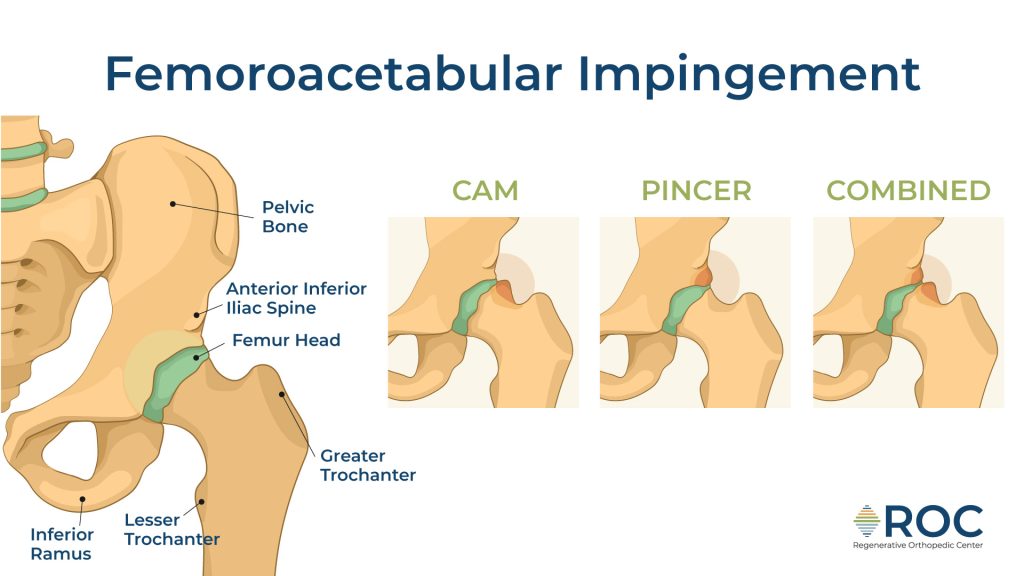Femoroacetabular Impingement (FAI) is a condition where abnormal bone growths in the hip joint cause friction during movement, leading to pain and potential damage to the joint. At ROC, Dr. Mark Wagner, a leading expert in hip conditions, provides comprehensive care for patients dealing with FAI, ensuring they receive the most effective treatment tailored to their needs.
What is Femoroacetabular Impingement (FAI)?
FAI occurs when extra bone grows along one or both of the bones that form the hip joint — the femoral head and the acetabulum. This overgrowth, or bone spurs, causes the bones to rub against each other during movement, leading to pain, stiffness, and limited range of motion. Over time, this friction can damage the cartilage and lead to conditions such as labral tears or osteoarthritis.

Symptoms of FAI
Patients with FAI often experience:
- Pain in the groin area, especially during activities that involve hip flexion.
- Stiffness or reduced range of motion in the hip.
- A clicking or locking sensation in the joint.
Dr. Wagner stresses the importance of early diagnosis and treatment to prevent further joint damage and maintain hip function.
Treatment Options at ROC
Dr. Wagner offers a range of treatment options for FAI, from conservative therapies to advanced surgical techniques:
- Conservative Management: Initial treatments may include sports medicine to strengthen the muscles around the hip and improve joint mechanics, as well as anti-inflammatory medications to reduce pain and swelling.
- Activity Modification: Avoiding activities that exacerbate symptoms, such as deep squatting or pivoting movements, can help manage pain and prevent further damage.
- Hip Arthroscopy: For patients who do not respond to conservative treatments, Dr. Wagner may recommend hip arthroscopy. This minimally invasive surgical procedure allows Dr. Wagner to correct the underlying bone abnormalities, repair damaged cartilage, and relieve impingement, all through small incisions.
- Open Surgery: In more complex cases, open surgery may be necessary to reshape the bones of the hip joint. This option is typically reserved for patients with significant structural abnormalities or advanced joint damage.
Why Choose ROC for Your FAI Treatment?
At ROC, Dr. Mark Wagner combines his expertise in hip preservation with a patient-centered approach, ensuring that each individual receives the highest standard of care. Whether you’re experiencing early symptoms or dealing with chronic hip pain, Dr. Wagner and the team at ROC are here to help you regain your mobility and quality of life.
If you suspect you have FAI or have been diagnosed with this condition, schedule a consultation with Dr. Wagner at ROC. With his specialized knowledge and the state-of-the-art facilities at ROC, you can trust that you’re receiving the best care available for your hip health.
